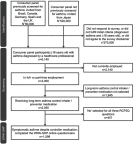Asthma impacts on workplace productivity in employed patients who are symptomatic despite background therapy: a multinational survey
- PMID: 31372003
- PMCID: PMC6636188
- DOI: 10.2147/JAA.S204278
Asthma impacts on workplace productivity in employed patients who are symptomatic despite background therapy: a multinational survey
Abstract
Background: Asthma affects millions of people worldwide, with many patients experiencing symptoms that affect their daily lives despite receiving long-term controller medication. Purpose: Work is a large part of most people's lives, hence this study investigated the impact of uncontrolled asthma on work productivity in adults receiving asthma maintenance therapy. Patients and methods: An online survey was completed by employed adults in Brazil, Canada, Germany, Japan, Spain and the UK. Participants were confirmed as symptomatic using questions from the Royal College of Physicians' 3 Questions for Asthma tool. The survey contained the Work Productivity and Activity Impairment - Specific Health Problem questionnaire and an open-ended question on the effect of asthma at work. Results: Of the 2,055 patients on long-term maintenance therapy screened, 1,598 were symptomatic and completed the survey. The average percentage of work hours missed in a single week due to asthma symptoms was 9.3%, ranging from 3.5% (UK) to 17.4% (Brazil). Nearly three-quarters of patients reported an impact on their productivity at work caused by asthma. Overall work productivity loss (both time off and productivity whilst at work) due to asthma was 36%, ranging from 21% (UK) to 59% (Brazil). When asked how asthma made participants feel at work, many respondents highlighted how their respiratory symptoms affect them. Tiredness, weakness and mental strain were also identified as particular challenges, with respondents describing concerns about the perception of colleagues and feelings of inferiority. Conclusions: This study emphasizes the extent to which work time is adversely affected by asthma in patients despite the use of long-term maintenance medication, and provides unique personal insights. Strategies to improve patients' lives may include asthma education, optimizing asthma management plans and running workplace well-being programs. Clinicians, employers and occupational health teams should be more aware of the impact of asthma symptoms on employees, and work together to help overcome these challenges.
Keywords: asthma; burden; costs; work productivity.
Conflict of interest statement
KGJ has spoken on behalf of, and worked as a consultant for, AstraZeneca, Boehringer Ingelheim International GmbH, Chiesi, GlaxoSmithKline, Mundipharma, Napp, Novartis and Pfizer, outside the submitted work. MT has received honoraria from the following companies marketing respiratory and allergy products: Aerocrine, Boehringer Ingelheim International GmbH, GlaxoSmithKline, Merck Sharp & Dohme, Novartis and Pfizer, outside the submitted work; he is also a member of the BTS/SIGN Asthma guideline steering group and the NICE Asthma Diagnosis and Monitoring guideline development group. MRR reports personal fees from AstraZeneca, Boehringer Ingelheim International GmbH, Chiesi, Menarini, Mundipharma, Novartis, Pfizer, Teva and Bial, and grants and personal fees from GlaxoSmithKline, outside the submitted work. JMF reports being a member of advisory boards for AstraZeneca, Boehringer Ingelheim International GmbH, Novartis, Sanofi-Regeneron, Circassia and Teva; has been paid honoraria for lecturing at symposia organized by these companies; and has also undertaken clinical trials through his employer, the University of British Columbia, for these companies and GlaxoSmithKline. Funding was also provided to the University of British Columbia by Boehringer Ingelheim International GmbH during the conduct of this study. In the last 5 years IP has received speaker’s honoraria for speaking at sponsored meetings from AstraZeneca, Boehringer Ingelheim International GmbH, Aerocrine, Almirall, Novartis, Teva, Chiesi and GlaxoSmithKline, and payments for organizing educational events from AstraZeneca and Teva. He has received honoraria for attending advisory panels with Genentech, Regeneron, AstraZeneca, Boehringer Ingelheim International GmbH, GlaxoSmithKline, Novartis, Teva, Merck, Sanofi, Circassia, Chiesi and Knopp. He has received sponsorship to attend international scientific meetings from Boehringer Ingelheim International GmbH, GlaxoSmithKline, AstraZeneca, Teva and Chiesi. He has received a grant from Chiesi to support a phase 2 clinical trial in Oxford. JMH is an employee of Boehringer Ingelheim International GmbH and UE is an employee of Boehringer Ingelheim Pharma GmbH & Co. KG. CV has spoken on behalf of, and worked as a consultant for, Boehringer Ingelheim International GmbH and Novartis. The authors report no other conflicts of interest in this work.
Figures






References
-
- GBD. 2015 Chronic Respiratory Disease Collaborators. Global, regional, and national deaths, prevalence, disability-adjusted life years, and years lived with disability for chronic obstructive pulmonary disease and asthma, 1990–2015: a systematic analysis for the Global Burden of Disease Study 2015. Lancet Respir Med. 2017;5(9):691–706. doi:10.1016/S2213-2600(17)30293-X - DOI - PMC - PubMed
-
- Global Initiative for Asthma. GINA report: global strategy for asthma management and prevention. Available from: http://ginasthma.org/2018-gina-report-global-strategy-for-asthma-managem.... Accessed October 22, 2018.
LinkOut - more resources
Full Text Sources

